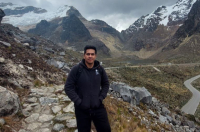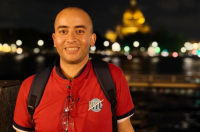Thank you for joining me once again! When we last spoke, you were a Master’s student at ITMO. Now, you’re in a PhD program while also working in China. Could you start by telling us about your journey from Master’s studies to where you are now?
Absolutely. I recently completed my Master’s program at ITMO’s Faculty of Technological Management and Innovations and have now started a PhD in economics. During those two years of my Master’s, I had the chance to gain practical experience by assisting with teaching. Initially, I helped with classes at ITMO for one semester, and later I became a coordinator for international relations at my faculty. That experience was invaluable, especially in developing soft skills and communication skills, which helped me handle different professional challenges and prepared me well for my PhD.
That’s wonderful! So you went straight from Master’s studies to doing a PhD?
Yes, that’s correct. I started my PhD in economics at ITMO while also receiving an offer from Jilin International Studies University (JISU) in China to work as a professor. ITMO also asked me if I could take on the role of a coordinator for international relations, focusing on connections with South American universities. I humbly said yes, as it was an amazing opportunity to contribute to the university's international activities while continuing my studies.
So, right now, you’re managing both your PhD and a teaching role at JISU. How do you balance it all, especially with the time difference?
For me, it’s all about discipline and organization. I plan my time carefully, setting up specific time blocks for my classes in China, meetings with South American universities, and my PhD work. I’ve even set up three clocks in my room to keep track of different time zones! I find it essential to respect the schedule I set. That way, I can manage everything even when unexpected issues arise.
I admire your discipline! How did your journey with JISU begin?
During my Master’s, I started working as a teaching assistant at ITMO and then lectured at various universities in Moscow and St. Petersburg, like Peter the Great St. Petersburg Polytechnic University and HSE University. These experiences built up my teaching portfolio, which aligned well with my long-term goal of working in China. I had planned my studies and career steps methodically, setting objectives to gain diverse experiences. I connected with JISU, having known them from previous interactions, and the opportunity to teach there felt like a natural next step.

Diego with his students at JISU. Photo courtesy of the subject
It’s clear you had a solid plan. Can you tell us a bit about the subjects you’re currently teaching in China?
Certainly! At JISU, I teach within the Spanish department, but I focus on subjects like innovation, entrepreneurship, and corporate communication. The university has a unique approach to language studies – here, students learn the language through their specific career paths, so students of business studies are learning a new language while studying international business and other relevant topics. Similarly, a student majoring in AI would learn core subjects like programming in a foreign language.
That’s a great concept. Besides Spanish, what other languages are taught at JISU?
There’s a wide variety. We have programs in Russian, Ukrainian, German, French, Persian, and more. The university even has a “Global Village” building, where each classroom immerses students in the culture of the language they’re studying. For instance, the French classrooms have a model of the Eiffel Tower and other prominent buildings in France. It’s almost like stepping into a mini-museum for each language, and students really enjoy it.
Fascinating! So, you’ve settled in China now – how’s your life there on a personal level?
It’s going really well. I’m living in Changchun, which is quieter than cities like Beijing or Shanghai, a very peaceful and comfortable city indeed. I’m living on the campus, which makes everything convenient, from grabbing meals to meeting friends. The people here are very friendly and helpful, which has made adapting a lot easier. I am also attending Chinese lessons since it is very important to know the local language when you live and work in a foreign country.
That sounds lovely. How is the weather in Changchun?
It’s calm at the moment, but the snow will arrive soon. Winter here reminds me of St. Petersburg, but it is without as much rain. January and February are winter vacation months, so I’ll have some time off to enjoy the season.
Any plans for your winter vacation?
Yes, I’m planning to visit some friends in Hangzhou. I was there in June and have wanted to go back since then. I’ll likely stay in China, but it’ll be nice to catch up with everyone here.

Diego with his colleagues at JISU. Photo courtesy of the subject
Sounds like a good plan! Shifting back to ITMO, could you tell us more about your objectives in your role as the coordinator of international relations?
Our main objective is to develop meaningful international collaborations. Right now, we’re actively working on agreements and organizing events with universities from Chile, Argentina, and Peru, which is key to fostering exchanges of knowledge and experiences in higher education across the region. Additionally, we’re holding meetings with prominent Chinese institutions, such as the Shanghai Jiao Tong University, with a strong focus on fields like artificial intelligence, innovation, and entrepreneurship. These collaborations aim to bridge the expertise between regions and help drive academic advances.
A crucial aspect of our work also involves partnerships with the Latin American Chamber of Commerce in Russia. This collaboration is essential for promoting business and academic relations between Latin America and Russia. By working with the Chamber, we’re aiming to create new opportunities for joint projects that benefit everyone involved – students, universities, and businesses alike.
Super interesting! With so many paths to take, how do you envision your future?
Right now, my main goal is to stay in China long-term while establishing my career in both China and Russia. I feel optimistic about the future, and I’m working closely with JISU and ITMO to build something lasting.
Truly inspiring! Finally, is there anything you’d like to add?
Yes, I’d like to express my gratitude to JISU and ITMO. Both institutions have supported me immensely and provided opportunities that have shaped my career. I’m truly thankful.




